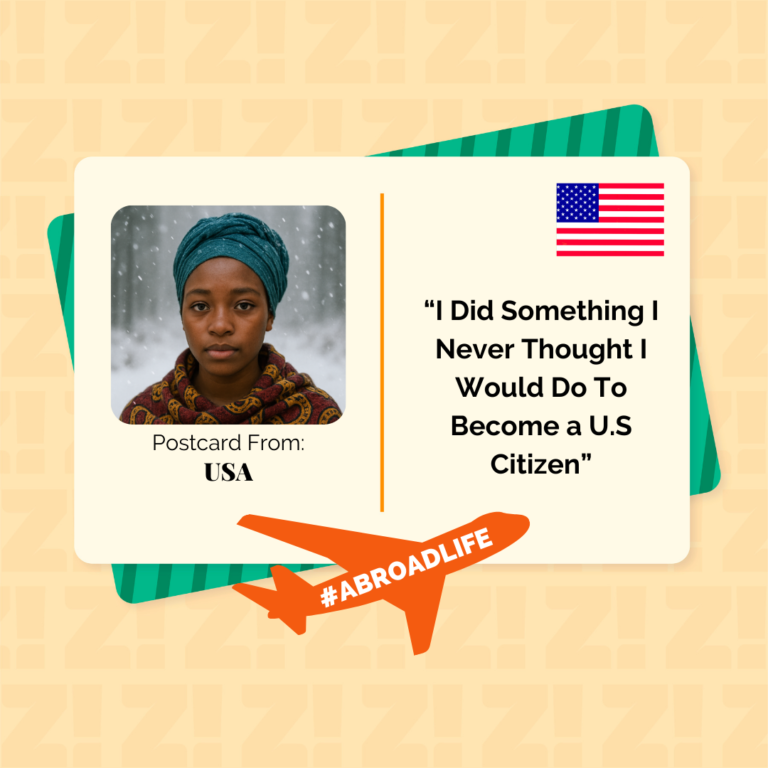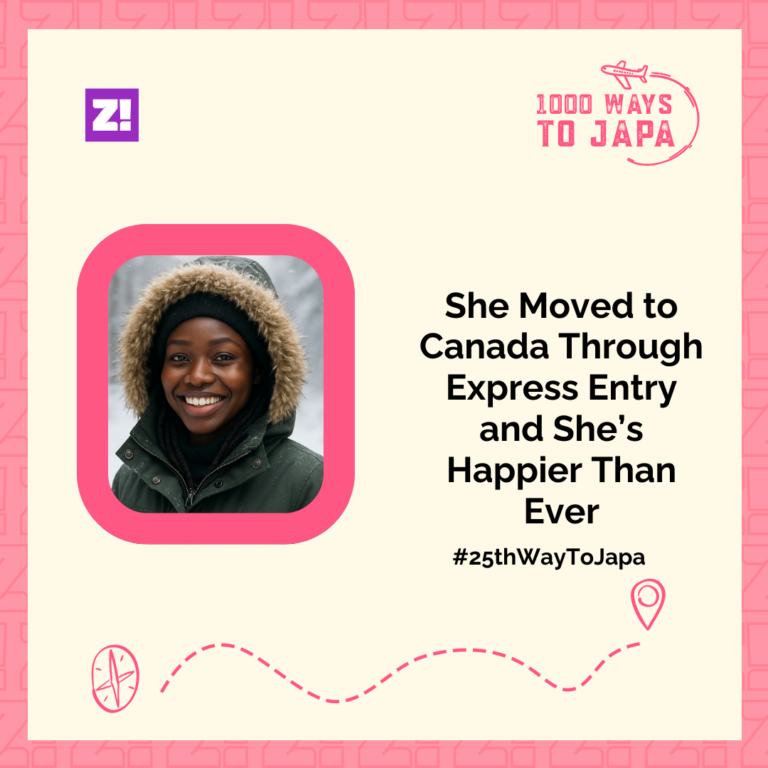Someone you know has left or is planning to leave. 1,000 Ways To Japa will speak to real people and explore the infinite number of reasons and paths they use to get to Japa
Betty (25) started her NYSC program and realised that law practice wasn’t for her. In this edition of 1,000 Ways to Japa, she shares how her love for entrepreneurship inspired her to apply for a fully funded Master of Business Administration (MBA) program in the US and how others can do the same.
Where do you live, and when did you move from Nigeria?
I live in the United States and moved here in the summer of 2024.
Congratulations! How did that happen?
I moved here for my MBA (Masters of Business Administration). I am a lawyer originally, but I didn’t like my day-to-day job. I also knew I didn’t want to do a master’s degree in law. Also, while practising law in Nigeria, I ran a side business, and I enjoyed being a business owner more than a lawyer. This drove me to study something that aligned with my interest in the US. That’s how I moved here. I found the perfect program and got offered a scholarship.
How did you apply for the program and scholarship?
While most schools ask you to write an essay, some schools will also ask you to take a Graduate Record Examination (GRE) or Graduate Management Admission Test (GMAT) if you didn’t study engineering or something related to math as an undergraduate. I knew I didn’t want to take the GMAT or GRE because paying for it in naira was expensive. What I did instead was to target US schools that didn’t require me to sit for either of these exams.
How did your search go?
I found some schools, and I applied. During the application process, I took a course called MBA Math to help me prepare since my background is in law and we don’t do a lot of maths in law. It’s a self-paced course that can be completed in two to 12 months.
I also started reaching out to schools that I was interested in. I made it a priority to attend all the events organised by the schools and connected with some of its current students on LinkedIn. Sometimes, I’d ask them to have a coffee chat with me. The reason I went to these lengths is that most schools in the US rely on recommendations for MBA admissions. They like to hear that you have spoken to somebody in the school or attended their recruiting events.
That was a thoughtful move
I knew I didn’t have the GMAT or GRE, so I had to do everything necessary to stand out. I applied to about four schools and got interview invites for three. I prepared for the interview process and took the time to write my essays. I ensured that my essay discussed my experience as a lawyer and an entrepreneur in Nigeria and why I wanted an MBA. One of the schools offered me a 60% scholarship, the other offered me a 30% scholarship, and then one offered me a full scholarship. I took the full scholarship offer.
While applying, I ensured these schools were ranked fairly well enough in America because MBA programs are very competitive. You need a school ranked at least in the top 20 or 30 to improve your chances of getting recruited in America. I got the offer in April, and I moved in July.
Which school will you recommend to anyone else who is interested in a fully-funded MBA program?
USC Marshall and Simon Business School are great schools. They also don’t necessarily require you to write the GMAT. The best thing would be to google the top 20-30 business schools and work your way through their requirements.
I’m curious. Did you pay application fees to each of these schools?
I didn’t have to pay because I found out that these schools mostly email you a code for an application fee waiver when you attend their events. So, a pro tip is to attend the events and reach out to people. Sometimes, your application portal will show how to get a waiver during certain periods before the deadline.
You can also send the school an email for a waiver code and keep your fingers crossed that they’ll send it.
That’s smart. What made your application essay stand out?
I contacted international MBA students on LinkedIn and asked if they could share their essays or resources. I also picked up some tips from the events I attended in each school. They will tell you what they want to see in the application and what they want your essay to discuss. Most application essays will give you a specific prompt like “Tell us about a time you had to deal with adversity”. Reading people’s essays and attending school events to find out what each school wanted helped me put a structure to my story. I also asked those people to read and review my essay.
What are your recommended tips for anyone who’s applying in 2025?
Start with a sketch for your essay. If the essay is about resilience, you should have one paragraph stating what resilience means to you. The second paragraph should discuss how you’ve displayed resilience in life. The third paragraph should talk about what you learnt from it. The fourth paragraph should tell them how this resilience will benefit them in the program you’re applying for and how you intend to use resilience to get through it. The conclusion should highlight why you should be considered and how your experiences dealing with resilience have prepared you for their program. You should also find out each school’s mission statement and tie whatever you’ve written to it. Talk about how the mission statement resonates deeply with you. That kind of structure helps your essay flow better.
ALSO READ: She Knows How to Write The Perfect Statement of Purpose, And She Wants To Teach Others
Do you have to apply for the scholarship separately?
For most schools in the US, no. It’s all dependent on the school you apply to. While some schools automatically indicate that they consider you for a scholarship or funding as you apply on their website, some schools will require a separate essay for independent scholarships. They’ll highlight that you must submit an essay under a column to be considered for those scholarships.
Thank you. You’ve mentioned LinkedIn a few times. Please share some networking tips.
First, never start with a simple “Hi” that contains no context for why you’re reaching out to the person. People are very busy. When you send a message to somebody that you’re trying to connect with, your first message should contain why you’re reaching out and your contact information.
You should also mention your availability for a meeting if they are open to discussing this further. It makes it easy for them to respond. They are either going to say yes or no. You should also be polite and not ask obvious questions or things you could have easily Googled because it doesn’t make you look good. You want to present your best self when you are communicating with people that can potentially be of significant assistance to you
I hear that. How has life been since you moved?
For the first time, I moved to a place where I didn’t know anybody. When I went to law school in Nigeria, my university classmates were there.. There was always somebody I knew. But this one is different because I moved to a part of the US where I don’t have close family or friends that I know well.
I also struggled with imposter syndrome when I started the program. On the first day of class, I heard a classmate introduce themselves as an Olympic diver. Someone else introduced himself as one of the top guys at PwC, and then there’s me, who had just finished serving Nigeria. Thankfully, I have started building a community here—most MBA schools have student groups from different African countries. so I try to connect with other Africans in my school. The day I landed at the airport to resume school, someone from the African group picked me up, helped me set up my house, and helped me locate the best places to live. These were super helpful, but the first two months were still hard.
ALSO READ: 7 Nigerians on How They Made Friends After Moving to the UK
How so?
I was saying goodbye to familiar things and struggling to build friendships— I had to push myself to socialize. If you’re serious about it, you must make a real effort to make friends here. If you’re not someone who keeps in touch, you’d find it hard to make friends here. You also have to learn to speak up and participate in class. Participation grade is like 40% of your entire grade. That’s something that I had to get used to by putting myself out there.
How is your program going?
It’s going well. It’s a two-year program. I am finishing my first year in May of this year and should graduate by May 2026.
Congratulations. On a scale of one to ten, how happy are you in the US?
Good question. I’m still in school and haven’t been able to do everything I want to do, so I’ll say 8. When I graduate and get a great job, it should be higher. But I’m grateful for how patient my professors have been. They’ve never made me feel bad for needing extra time to understand or ask questions often. They are always happy to explain everything patiently till I fully understand it.
Want to to share your japa story? Please reach out to me here.




